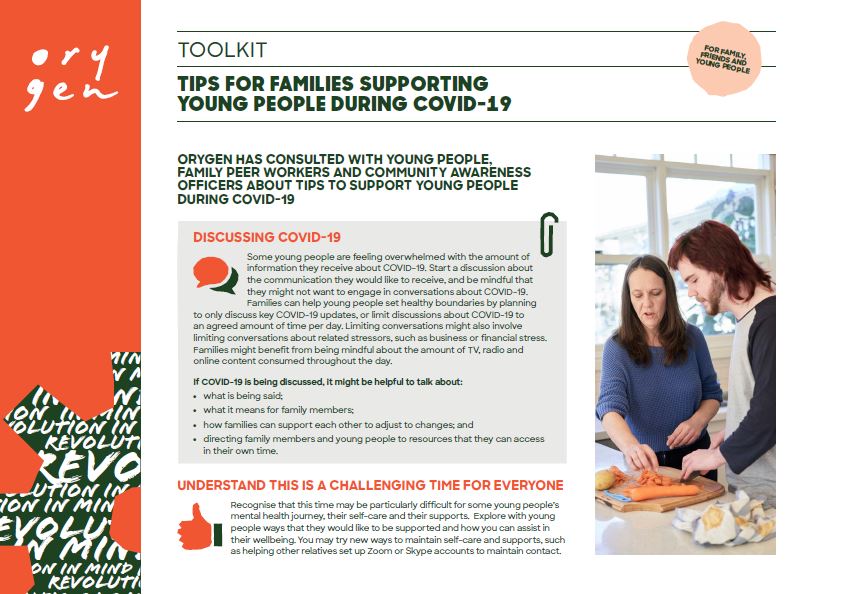Tips for families supporting young people during COVID-19
Orygen has consulted with young people, family peer workers and community awareness officers about tips to support young people during COVID-19.
Discussing COVID-19
Some young people are feeling overwhelmed with the amount of information they receive about COVID-19. Start a discussion about the communication they would like to receive, and be mindful that they might not want to engage in conversations about COVID-19. Families can help young people set healthy boundaries by planning to only discuss key COVID-19 updates, or limit discussions about COVID-19 to an agreed amount of time per day. Limiting conversations might also involve limiting conversations about related stressors, such as business or financial stress. Families might benefit from being mindful about the amount of TV, radio and online content consumed throughout the day.
If COVID-19 is being discussed, it might be helpful to talk about:
- what is being said;
- what it means for family members;
- how families can support each other to adjust to changes; and
- directing family members and young people to resources that they can access in their own time.
Understand this is a challenging time for everyone
Recognise that this time may be particularly difficult for some young people’s mental health journey, their self-care and their supports. Explore with young people ways that they would like to be supported and how you can assist in their wellbeing. You may try new ways to maintain self-care and supports, such as helping other relatives set up Zoom or Skype accounts to maintain contact.
Take an individualised approach
Every young person is different. You may want to start a conversation about how they are feeling, what they need, and what support they might want during this time. Acknowledge how difficult it is not seeing some people, and that other family members are finding it difficult too. These young people may appreciate setting regular intervals for checking in and having these conversations. However, some young people may have other existing supports, and one way that families may provide support could be to find ways to provide them with additional space.
Understand capacity
Some young people are feeling pressured to be more productive during this time, but adjustments and stress relating to COVID-19 leaves many of us with a reduced capacity or ability to complete our usual tasks. Try to let the young person know that they don’t need to be more productive, and that you don’t assume that they have additional free time or less stress. Some young people may want to work collaboratively to set goals around achieving tasks and keeping motivated whilst working from home.
Recovery is a journey
Some families might understand mental health recovery to be linear and have reported feeling stressed about the recovery process being slowed due to COVID-19. Previous goals relating to socialising and going back to school have needed to adjust or be postponed, but this doesn’t necessarily mean that recovery is impacted or that their time with Orygen will be changed in duration or quality. Recovery can still be maintained while staying at home.
Listen to frustrations
Many young people are finding it very difficult to not see their friends as often or leave the house, which may have been a common part of their routine, and some of their self-care strategies may now be considered ‘non-essential’ during this time. Allow them to vent their frustration or sadness without minimising how they might be feeling. Families can share that they feel a similar way, without necessarily needing to problem-solve or offer suggestions. Family members can suggest walks, caring for pets, cooking, board games or just leaving each other alone!
Respect space and privacy
Young people using telehealth to seek support require confidentiality and privacy. Help young people find or create confidential spaces in the house, and be mindful of their privacy during these appointments. Despite these meetings occurring in the same house, these meetings are still confidential, private, and not less casual or less formal than their regular face-to-face appointments. For family telehealth meetings, discuss whether people wish to be together or in different rooms. If a young person is becoming more open to discussing their mental ill-health, make sure that they feel supported and heard.
Take care of yourself
- Maintain a healthy lifestyle.
- Remember times change (this pandemic will end).
- Stay informed & access support stay connected to Orygen and any family member can access a Family Peer Support Worker.
- Communicate effectively with everyone in your isolation ‘bubble’.
Whether you are communicating with a spouse, child, sibling, parent, friend or co-worker, effective communication is key to avoiding misunderstandings, misinterpretations and conflict.
Tips to support effective communication
- Be clear in communication. Try to be as unambiguous, neutral and clear in your communication as you can.
- Allow the other person the room to speak. In all communication, it is important to allow the other person space to talk.
- Non-verbal communications. Tone of voice, pace of speech and body language all combine to create a full picture of what you are trying to say. It is often helpful to keep tone of voice and facial expression neutral.
Avoid
- Hiding frustration or anger.
- Blaming - it is normal to experience frustrations in life that can make us less aware of what is happening for other people.
Remember that we are all human too, so you are not expected to get it right all of the time.
RESOURCES
Supporting your teen during coronavirus
Maintaining your mental health during social isolation
 Download these tips
Download these tips